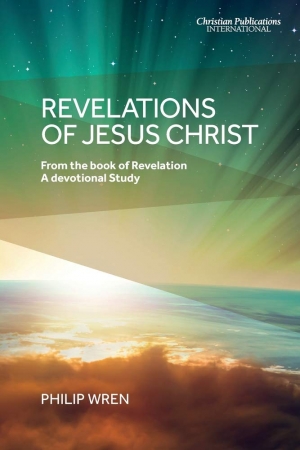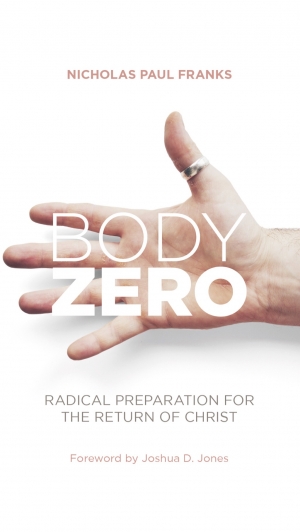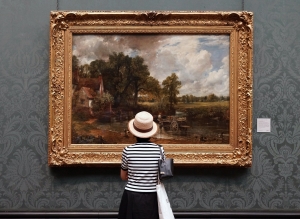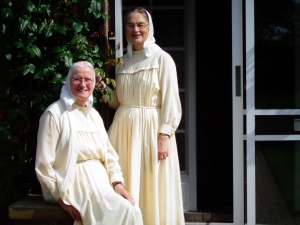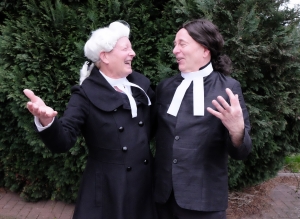General
Displaying items by tag: Jesus
Review: The Way of Salvation
Paul Luckraft reviews ‘Derech Yeshua: The Way of Salvation’ by Daniel Nessim (2013, Chosen People Ministries).
Review: Revelations of Jesus Christ
Simon Pease reviews ‘Revelations of Jesus Christ from the Book of Revelation’ by Philip Wren (Christian Publications International, 2019)
Review: Body Zero
When Evil Becomes Ordinary
On the need to guard our hearts.
Not a day seems to go by at the moment without some drastic event or other filling our newspapers and screens – not helped, of course, by 24/7 broadcasting, Twitter and every other way in which modern technology allows us to access events all over the world almost in real time. The effect on our hearts, minds and spirits can be overwhelming. We are on information overload - more so than any other generation in human history.
This week, continuing demonstrations in Hong Kong against Chinese tyranny have vied for airtime with growing instability in Kashmir, more devastation in Syria, the US-China trade war, a possible arms race between the US and Russia and escalating tensions with Iran in the Gulf. And of course we cannot and should not forget the mass murders of Christians happening across North Africa virtually every day, though they go largely unreported.
Never mind Brexit and Project Fear: the global ‘birth pangs’ heralding the return of our Messiah genuinely seem to be increasing in both frequency and intensity.
Bloodshed Follows Bloodshed
Perhaps most shocking of all this week has been news of the two mass shootings in the USA, claiming 22 lives in Texas and nine in Ohio, both carried out by deeply disturbed young men (aged 21 and 24, respectively). At the same time, at home we heard of a young child being hurled off a high viewing platform at the Tate Modern in London, allegedly an unprovoked attack by a teenage boy.
Surely God’s lament through the Prophet Hosea to morally degenerate Israel is pertinent: “There is no faithfulness, no love, no acknowledgment of God in the land. There is only cursing, lying and murder, stealing and adultery; they break all bounds, and bloodshed follows bloodshed” (Hos 4:1-2).
Children Plotting to Kill
When our children and young people are plotting to kill, something is drastically wrong: this very concept is awful and provocative, and should be prompting searching questions.
But when the US shootings were first reported, I reacted probably in much the same way as many did: a few moments thinking how terribly regrettable it all was, before getting on with my day. It wasn’t until I read a testimony from the family of one of the victims, daring to forgive the perpetrator with true Christian grace, that I was actually brought to tears and prayer.
How easy it is, unless special care is taken, to grow accustomed to the gradual encroachment of evil as an ordinary part of everyday life.
How easy it is, unless special care is taken, to grow accustomed to the gradual encroachment of evil as an ordinary part of everyday life. We’ve seen it all too many times before; our hearts gradually harden to it, often imperceptibly. But the above verses from Hosea carry a warning: the spread of evil in a society and the departure of love are two sides of the same coin.
Pondering these things, I was reminded of Jesus’ salutary warning in Matthew 24, that “Because of the increase in wickedness [in the times of the end] the love of most will grow cold – but the one who stands firm to the end will be saved” (v12). Let’s consider this more for a moment.
Global Cooling?
How, precisely, might an increase in wickedness around the world threaten the love in our own hearts? Jesus’ description of love ‘growing cold’ here is translated using a Greek word (psuchó) meaning to breathe or blow on something in order to cool it down. Basic science teaches us that warm objects lose their heat when they are exposed to a cooler environment. Just so, spiritually: spending too much time immersed in contemplating the world’s evil is enough to cool the love in anyone’s heart even to numbness.
But another way objects can grow cold is by going underground, hiding away in places where neither day nor night can permeate. Just as the love of God in our hearts can be chilled by constant contemplation of evil, so a total refusal to acknowledge or face up to the realities of evil can have the same effect. This deliberate avoidance hardens hearts in self-defence.
A third way in which things grow cold is through inactivity, which perhaps speaks for itself as a spiritual problem. And a fourth way is through isolation – simply by not being near other sources of heat. Many Christians in Britain are finding themselves in a season of spiritual isolation at the present time; though God-given, these nevertheless come with their own challenges and are not intended to be permanent.
The spread of evil in a society and the departure of love are two sides of the same coin.
Staying Warm
Jesus followed his outline of the terrible days which will precede his return (Matt 24) with a series of parables designed to teach his disciples how to ‘stand firm to the end’, their hearts alive and warm: strengthened by time in the warmth of God’s presence, invigorated by the knowledge of his truth, goodness and victory.
These emphasise the need to be found prepared and filled with the Holy Spirit, faithful and active, wise, watchful and alert. Elsewhere in the New Testament the Apostles join the call for faithful, holy living (e.g. 2 Pet 3; 1 Tim 4; 2 Tim 3:1-4:5).
But, “over all these virtues put on love” (Col 3:14). It’s a cliché, but the fire of real, God-given love is the first and best antidote to these days in which we find ourselves.
True Values
Are you investing in fake or fortune?
Visiting family and friends over the past fortnight naturally exposed me to conversations – and television programmes – with which I am generally unfamiliar.
Among these was the intriguing BBC programme Fake or Fortune which, for this particular episode, focused on a rather beautiful portrait passed down through an aristocratic family line.
As it was unsigned, no-one was sure who had painted it. It was generally accepted as the work of a high-calibre artist of the mid-19th Century which, if proved to be the case, would fetch around £8,000 at auction.
However, another expert was convinced it was the work of the famous Thomas Lawrence, which would increase its value exponentially to some half a million pounds! And, indeed, it proved to be one of his!
The Stakes are High
There’s a lot at stake over the question of who’s behind a particular work of art. I got to thinking how this inevitably also applies to the Creator of the world: is God behind the beauty of our Creation, or are we to put our trust in Charles Darwin’s ideas?
Come to that – who wrote the Bible? Was it God, or man? These are big questions, and the stakes are high in terms of the answers.
According to the Apostle Paul, the acknowledgement of God as Creator is of vital importance. In fact, he points out, the denial of such leads to a progressive unravelling of civilisation itself.
According to the Apostle Paul, denying God as Creator leads to a progressive unravelling of civilisation.
Under the inspiration of the Holy Spirit, Paul writes that men suppress the truth by their wickedness (Rom 1:18) – and the first casualty is the truth that God is Creator (vv19-20). As a result, their thinking becomes futile and they worship created things rather than the Creator (v23). This in turn leads to sexual degradation and the shameful lusts of lesbianism and homosexuality (vv26-27).
At the same time, it leads to “a depraved mind” (v28) filled with “every kind of wickedness” – even inventing ways of doing evil (vv29-30).
In this letter to the 1st-Century Christians in Rome, Paul was writing in the context of a civilisation that was well on its way to being unravelled – and remarkably comparable to 21st-Century Britain! Strange, and yet we are constantly being told that things have ‘moved on’…
Whose Hand?
The psalmist wrote: “The heavens declare the glory of God; the skies proclaim the work of his hands” (Ps 19:1).
Sir David Attenborough enthuses over the wonderful creatures God has made without ever mentioning their Maker, but sure to always emphasise how many millions of years it has taken each species to evolve. Yet Scripture says that God created the world in six days!
Yes, the stakes are high. Our values depend on recognition of whose hand is behind the canvas before us. A life lived in the knowledge of him through whom all things were made (John 1:3) – the greatest ‘artist’ of all time – will be truly priceless.
As Jesus asked, “What good is it for a man to gain the whole world, yet forfeit his soul?” (Mark 8:36). Knowing Jesus is the key to life. “He who has the Son has life; he who does not have the Son of God does not have life” (1 John 5:12).
A life lived in the knowledge of him through whom all things were made (John 1:3) – the greatest ‘artist’ of all time – is truly priceless.
Rebuilding the Walls
I don’t believe the residents of Derbyshire’s Whaley Bridge, threatened by a breach in the reservoir above them, merely crossed their fingers as the BBC correspondent reported they were doing. When a further thunderstorm was forecast but subsequently passed over the village, I am apt to conclude that residents had taken to genuine prayer. There are no atheists in a trench, they say.
 The church built on the Mount of Beatitudes – the reputed site of Jesus’ famous sermon. Picture: Charles Gardner
The church built on the Mount of Beatitudes – the reputed site of Jesus’ famous sermon. Picture: Charles Gardner
As exemplified by the Whaley Bridge crisis, the walls have broken down in British society. And as in Nehemiah’s day, when the walls of ancient Jerusalem were in ruins, we too must return to the God of Israel if we wish to rebuild our country on solid foundations.
Concluding his famous Sermon on the Mount, Jesus said: “Therefore everyone who hears these words of mine and puts them into practice is like a wise man who built his house on the rock. The rain came down, the streams rose, and the winds blew and beat against that house; yet it did not fall, because it had its foundation on the rock.
“But everyone who hears these words of mine and does not put them into practice is like a foolish man who built his house on sand. The rain came down, the streams rose, and the winds blew and beat against that house, and it fell with a great crash” (Matt 7:24-27).
The Joy of Jesus
Giving thanks for the Jews’ most precious gift to us
Just as the modern state of Israel was born out of the ashes of the Holocaust in perfect fulfilment of Ezekiel’s prophecy of dry bones coming back to life, so too did a new love for the Jewish people emerge from the rubble of Germany.
Shocked and devastated by the destruction of their home city of Darmstadt through the RAF bombing of 11 September 1944, which saw 12,000 killed and many more made homeless, Evangelical Sisterhood of Mary founder Basilea Schlink saw it as judgment for her country’s mass murder of the Jews.
But it stirred her heart to repentance and sorrow, as a result of which the movement was dedicated to confessing the sin of her nation and to making restitution with God’s chosen people, chiefly by loving and serving them in whatever way they could.
Now an international organisation with branches all over the world, they continue to bless the Jewish people as, full of the joy of Jesus, they demonstrate unbounding gratitude for their gift of the scriptures and, most of all, of their Messiah.
Solidarity and Reconciliation
My wife Linda and I have just attended the golden anniversary of the UK branch, based in a Hertfordshire village near London, when they looked back with amazement at the reconciling power of the Cross modelled beautifully by the current residents – Sister Thekla from Germany and Sister Glory from England – representing the nations once at war with each other.
Just as the modern state of Israel was born out of the ashes of the Holocaust, so too did a new love for the Jewish people emerge from the rubble of Germany.
A measure of the impact they have made is apparent in the way they have been embraced by the local Jewish community, who have not only accepted invitations to their many events but have also in turn welcomed the sisters into their synagogues!
One of the sisters’ annual 'Israel Day' events included the testimony of the son of a Nazi now reaching out in love to the Jews as part of his role as a disciple of Jesus. Half the audience on that occasion were from the Jewish community, one of whom later wrote: “We were overwhelmed by the event.”
Sister Thekla explained that, in sharing their shame and sorrow for the guilt of the nations, Jewish groups are greatly moved. “The smallest sign that we recognise what they went through touches them deeply.”
Maranatha
Bearing in mind that the name of their UK home is Jesus’ Return, the weekend theme was, appropriately, “The Spirit and the bride say, ‘Come!’” (Rev 22:17) – a reference to the Second Coming. And as their house name implies, their focus is very much on Jesus himself and his soon return.
Always welcoming, praying, believing and encouraging, their irrepressible joy is impossible to ignore, proving a magnetic draw to the One they adore.
Against the background of Christianity’s guilt towards the Jewish nation, guest speaker Sister Verita (currently based at their Jerusalem branch and originally from New York) challenged us from Romans 11:11: “That is the call of the Church – making the Jews jealous, causing them to ask what is the source of the faith, hope, love and joy that we have in the Messiah” (see Psalm 126).
Above all, the sisters point to Jesus, who is the way, the truth and the life (John 14:6). But we have lost our way as a nation, and need to rediscover our true destiny.
Always welcoming, praying, believing and encouraging, the sisters’ irrepressible joy is impossible to ignore, proving a magnetic draw to the One they adore.
Jesus is the Way
This was brought home to us when we temporarily got lost after losing our GPS signal en route to the event. Even the road sign we were looking for was covered in foliage, an increasingly common sight across the country, causing Linda to remark: “In a year’s time, no-one will know where to go.”
A prophetic statement indeed for where we are today – lost in a fog of pointless activity as we struggle through a maze of no-through-roads, disconnected from the true source of life and direction while blindly taking wrong turns.
We desperately need to rediscover how to find our way through life, plugged into the Maker’s instructions rather than unreliable Satnavs. Jesus is the way!
Walking in Ancient Paths
We took a lovely walk in the Cotswolds on our journey back, but again got lost temporarily where the once well-worn path was overgrown. We needed to retrace our steps and get back on track.
As Jeremiah wrote, “This is what the Lord says: ‘Stand at the crossroads and look; ask for the ancient paths, ask where the good way is, and walk in it, and you will find rest for your souls’” (Jer 6:16).
Jesus fulfilled that promise when he said: “Come to me, all you who are weary and burdened…and you will find rest for your souls” (Matt 11:28f).
Review: Beloved Warrior
Clifford Denton reviews ‘Beloved Warrior’ by Gail Dixon (ICT Media Tech/Print, 2019)
Gail Dixon has been in Christian ministry and missionary work for nearly 40 years, first with World Horizons and more lately leading its sister organisation, Nations Trust. This inspiring devotional book emerges from her wide-ranging experiences and is based on personal reflection over a long life of discipleship.
One imagines her sitting before the Lord, after all these years of walking with him and praying to him, and being inspired to share the most central aspects of her relationship with him. What has resulted is a book is about the covenant love of Jesus within the battle for the salvation of many - hence the title, Beloved Warrior.
The Battle and the Warrior
Gail includes some remarkable accounts of the intensity of this wider battle, which have resulted in fruit being borne for the Kingdom in lives saved and transformed by Jesus’ love. The accounts draw on both scriptural examples, of those who have gone before, and a multitude of modern-day examples.
But even though the book is about the battle for salvation, the book is structured around and focused on Jesus, the Beloved Warrior. Each of its ten chapters focus on a different characteristic of our Saviour and our relationship with him, including prayer, worship, rest, perseverance, faithfulness and surrender.
Beautiful Writing
Gail seeks to draw the reader into experiencing the Lord’s love and sharing it with others, whatever the commitment and cost. Her writing is scriptural, tender and powerful:
His warfare is full of mercy, full of healing, because the weapon is love. He woos us, through our bruising, and breathes onto us when our flame is dying. He longs for us to know that we are His beloved. He is never discouraged, and as we stand into His love, so we too will discover that we are warriors. His love, His power, flows through us. (p271)
All income from the book will be donated to the work of Nations Trust.
Beloved Warrior (158pp) is available from Amazon as a paperback (£10) and on Kindle (£2.65).
Wesley's Heart-Warming Message
Charles Gardner reviews the Sh’ma Kingdom Drama play about the legendary preacher.
Nearly 300 years after it happened, John Wesley’s conversion is still widely celebrated. For most great men, it is their birth that is usually remembered. But in Wesley’s case, it is what the Bible terms his ‘new birth’, recalled each year on 24 May.
As part of this year’s celebrations, a unique play was staged on the lawns of the Old Rectory where the preacher grew up, in the small town of Epworth in Lincolnshire (another performance is being planned elsewhere in the county for next month - see details below).
Performed by the Sh’ma Kingdom Drama group, I am John Wesley captivated an appreciative audience on a beautiful spring afternoon with a stirring invitation to share in the transforming experience that changed Britain and the world – a heart ‘strangely warmed’ by the Gospel, as the Methodist founder put it.
An Inspirational Invitation
We were treated to an inspirational weaving together of dance, dialogue and choral hymn-singing complete with audience participation – front row viewers were handed rolled-up tights to throw at the cast at a given signal to depict the fierce opposition Wesley’s preachers encountered on their travels.
The narration, backing music and PA system all worked together smoothly and the drama was enriched by authentic costumes. The waving of brightly-coloured flags helped to convey the traumatic scene when six-year-old John was rescued from an upper window during a blazing fire, which is why he came to be referred to as ‘a brand plucked from the burning’.
I am John Wesley captivated with a stirring invitation to share in the transforming experience that changed Britain and the world.
I was particularly moved by the sight of one of the cast, her face shining like an angel, worshipping her Saviour before moving towards the audience as she encouraged others to welcome Jesus into their lives.
With the audience also invited to join in some of Charles Wesley’s well-known hymns, some of the cast, including John Wesley, came out of character for a few minutes to share the story of their own life-changing encounter with Christ.
The Gospel, No Holds Barred
 Used with permission from the Sh'ma Kingdom Dancers.
Used with permission from the Sh'ma Kingdom Dancers.
Wesley’s conversion took place at Aldersgate, London, in 1738 and launched a 50-year ministry that included 40,000 sermons preached while travelling a quarter-of-a-million miles on horseback. Historians are agreed that we might well have suffered a revolution of the kind that brought chaos to France without his influence.
He often returned to Epworth and its environs, but wasn’t allowed to preach at the church where his father, Samuel, had been rector for nearly 40 years, choosing instead to use his father’s tomb as a pulpit as he lifted up Jesus to a crowd of thousands.
Considering it was only the third staging of the play, it was quite sensational in the way it combined entertainment – both visually and otherwise – with a no-holds-barred presentation of the Gospel.
The next performance of ‘I Am John Wesley’ will be taking place at Broughton Village Hall (DN20 OJX, near Brigg, Lincolnshire) on Saturday 31 August, beginning at 7pm. All are welcome to this free event – call 07940 222 707 for more details.
Find out more about the Sh’ma Kingdom Drama and Dancers on their website, www.shma-kingdomdancers.co.uk.
 Used with permission from the Sh'ma Kingdom Dancers.
Used with permission from the Sh'ma Kingdom Dancers.
Whom Do We Serve?
Debates over Brexit are revealing about the state of our hearts.
In Matthew 8:28-34 we read how Jesus freed two men of strong demon possession. Since this resulted in a substantial financial loss for the owners of a herd of swine that was present, we are told that the whole town beseeched the Son of God to leave their region. It is a sad but classic proof of why Jesus said that we cannot serve both God and money (Matt 6:24; Luke 16:13).
Somehow, this reminds us of the whole Brexit issue. This is because politics, the banking and corporate sectors, as well as the media, counterweight Britain’s prospective freedom from the EU with forecasts of a heavy economic loss. It’s easy, therefore, for people to get distracted from the more important spiritual and moral issues.
From a secular point of view, Britain must decide whether it really wants to leave an alleged safe haven and embark on an unknown path. In this framing of the argument, fear is made the driving force. From a biblical point of view, Britain must decide whether it wants to be free from political dictate or keep handing over its freedoms for the 'promise' of financial stability. Personal conviction is the motivating force here.
For all that, Brexit and its economic consequences are just fruits of a more foundational issue that believers, and indeed the whole nation, need to deal with: the question of whom they serve.
Britain must decide whether it wants to be free from political dictate or keep handing over its freedoms for the 'promise' of financial stability.
God or Money?
Jesus said the two most important laws that man must live by are (a) to love God with all that we are, and (b) to love our fellow men as ourselves (Matt 22:37-40; Mark 12:30-31; Luke 10:27). This also includes our enemies (Matt 5:43-44; Luke 6:27, 35). And Jesus left no doubt that if we love and serve God, we cannot love and serve money (Matt 6:24; Luke 16:13). Yet, loving and serving money is exactly what the financial system of the world demands.
A good many Christians see no danger here for themselves. They are confident that they are by no means serving money. And who can blame them? Most people generally have very little insight into how our money system works and its negative and enslaving effects.
The Financial System of the World
I believe that today’s financial system has evolved as a consequence of man rejecting God as the source of his provision, and instead creating his own supply system as a substitute (Jer 2:13). This system has become the basis of our productive economies and the financial world today. But it is an unjust apparatus and of evil design – like everything the world produces without God (John 7:7).
Most Christians are unaware that it violates God's word in virtually every way; its general use of fiat money, fractional reserve banking, interest, extensive debts and limited liability laws renders it exploitative, destructive and unsustainable. It is based on illusions, incessantly demands continual growth at the expense of our available natural resources, ruthlessly expropriates the little wealth of the majority of the population for the benefit of the few capital holders, and ultimately forces its rule on man.
Unsurprisingly, therefore, our economies and the world of finance appear more like war zones: battles are raging in currencies, profits or market shares, ruthless competition, hostile takeovers, dominance through innovation, market leadership and so forth. Blackmail, exploitation, betrayal, nepotism, influence peddling, manipulation, bribery, theft, fraud, lies, falsification of documents, discrediting others, etc., are only some of the weapons being used.
The justified question then is how does that all fit in with God’s fundamental laws of love, honesty, faithfulness and truth? The straight answer is, it doesn’t!
Loving and serving money is exactly what the financial system of the world demands.
For this reason, as far as believers are concerned, Brexit cannot simply be a matter of leaving an artificial union of states that is increasingly usurping the political sovereignty of its members. It also offers the opportunity to break free from forced subjugation to an economic system directed against God's will.
Our financial wellbeing does not depend on human alliances, regardless on which level, nor does it depend on the use of a wicked monetary system that enslaves and ultimately destroys. It depends on God alone (Deut 8:18).
Concrete Instructions
The Bible contains a remarkable number of passages dealing with money and economic issues. Obviously, God felt it necessary to give us a comprehensive spiritual perspective on these themes – firstly, because money plays an essential role in everyday life, and secondly, because it carries a strong potential to conflict with God’s plans and purposes for our lives (individually, corporately and nationally).
The challenge for Christians, situated within a worldly system and vulnerable to its pressures and influences, is to find ways to shun the world and follow our God’s wise instructions, since through him and for him everything was created and in him everything holds together (Col 1:16-17; John 1:2-3; Rom 11:36). His ways are neither tied to nor limited by the mainstream school of thought. Their implementation, however, presupposes openness to a very different paradigm (Rom 12:2; John 15:5; 1 Cor 3:11).
Our financial wellbeing depends on God alone.
Do We Really Know?
No human being knows what will happen tomorrow (Prov 27:1; Luke 12:18-20; James 4:14). Realistically, man without God can only make assumptions about the future – we can neither predict nor plan it (Prov 19:21; 1 Cor 13:9). As a result, man tries to tie down this uncertainty by extrapolating things of the past into the future and adjusting them based on human expertise, imagination, ingenuity, intelligence and wisdom.
Yet, bottom line, it all remains more guesswork than fact. Natural disasters, epidemics, terror, civil unrest, wars, rumours, bankruptcies, manipulation, corruption, vested interests, change of governments, etc., can turn things upside-down in a moment.
Given all this, who is to say that breaking free from evil dictate will indeed result in economic and financial mayhem? We really have no way of knowing. The fear-mongering surrounding Brexit, then, is a reflection less of the facts than of whom we are trying to serve.
Gottfried Hetzer is the author of 'Money ... The Great Deception', which we reviewed earlier this year.




